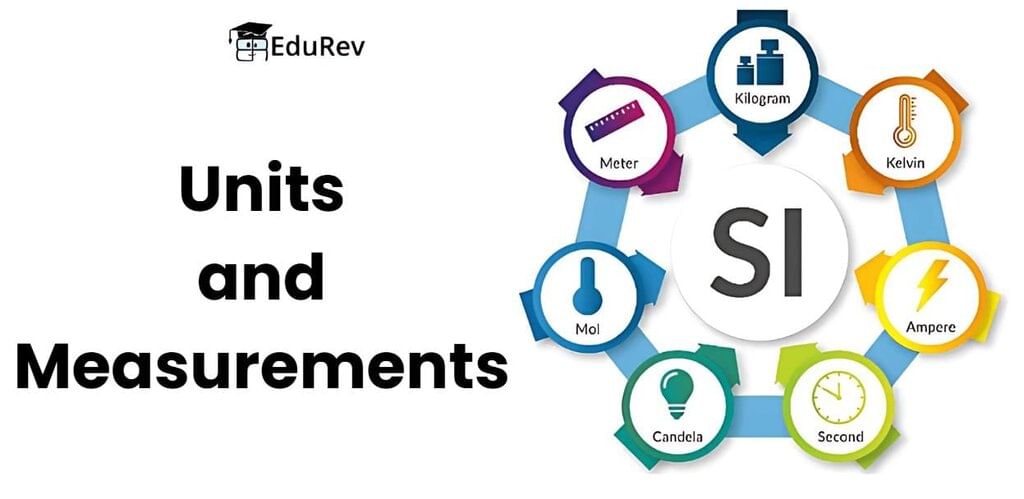10-Days Study Plan: Units & Measurements | Physics for JEE Main & Advanced PDF Download
Introduction
- Units and Measurements is a foundational topic in Physics, especially for exams like JEE or NEET. It covers basic concepts like units, dimensions, errors, and measurement tools, which help you understand how to quantify physical quantities accurately.
- This 10-day study plan is designed to help you master this unit step by step. You'll start with the basics, move to key concepts like significant figures and dimensions, learn about measurement errors and instruments, and end with practice and revision.
- Each day includes reading materials, videos, formulas, and practice tests to build your understanding and problem-solving skills.
- Most resources are from EduRev, with links provided for easy access. Stick to the plan, and you'll feel confident by the end.

Study Plan
Day 1: Introduction to Units and Measurements
Begin with the basics of units and measurements. Learn what units are, why they are important, and get an overview of the topic. This day sets the foundation for the rest of the plan.
- Read: Introduction to Units & Measurements
- Study: PPT: Units & Measurements
- Watch: Units and Measurements (YouTube)
- Practice: Review basic concepts and note down key points from the introduction.
Day 2: Scientific Notation and Significant Figures
Focus on how to express numbers in scientific notation and understand significant figures, which are crucial for accuracy in measurements. Also, cover basic math related to physics.
- Read: Scientific Notation & Significant Figures
- Watch: Significant Figures (YouTube)
- Study: HC Verma Solutions: Chapter 2 - Physics & Mathematics
- Practice: Solve simple problems on significant figures and notation.
Day 3: Dimensions of Physical Quantities and Dimensional Analysis
Learn about dimensions, how to find dimensional formulas, and use dimensional analysis to check equations and derive relations.
- Read: Dimensional Analysis & Formulas
- Watch: Dimensional Analysis (YouTube)
- Study: Test: Dimensions of Physical Quantities (as a learning tool, review questions)
- Practice: Multiple Choice Questions (MCQs): Dimensions of Physical Quantities
Day 4: Errors in Measurements, Accuracy, and Precision
Understand types of errors, how to calculate them, and the difference between accuracy and precision in instruments.
- Read: Accuracy, Precision of Instruments & Errors in Measurement
- Watch: Errors in Measurements (YouTube)
- Study: DC Pandey Solutions: Measurement & Errors
- Practice: Calculate errors in sample problems from the readings.
Day 5: Measurement Instruments - Vernier Caliper and Screw Gauge
Learn how to use vernier calipers and screw gauges for precise measurements, including reading techniques and least count.
- Read: Vernier Calipers and Screw Gauge
- Watch: How to Read Vernier Calliper (YouTube)
- Watch: Screw Gauge (YouTube)
- Practice: Simulate readings with examples from the resources.
Day 6: NCERT and HC Verma Solutions
Dive into standard textbook solutions to reinforce concepts from NCERT and HC Verma, covering introduction and key problems.
- Study: NCERT Solutions: Units & Measurement
- Study: HC Verma Solutions: Chapter 1 - Introduction to Physics
- Read: HC Verma Summary: Introduction to Physics
- Practice: Solve selected problems from HC Verma and NCERT.
Day 7: Practice Tests and Solved Examples
Apply what you've learned through tests and solved examples to identify weak areas.
- Practice: Test: Units & Measurement - 1
- Practice: Test: Units & Measurement - 2
- Study: Solved Example: Units & Measurements
- Watch: Solved Examples: Units and Measurement (YouTube)
Day 8: Previous Year Questions and Exemplars
Review questions from past exams to understand the pattern and difficulty level.
- Study: JEE Main Previous Year Questions (2021-2025): Units & Measurements
- Study: JEE Advanced Previous Year Questions (2018 - 2024): Units & Measurements
- Read: NCERT Exemplar: Units & Measurements
- Practice: Solve 10-15 PYQs and check answers.
Day 9: Revision Tools - Formulas, Mnemonics, and Visual Aids
Use quick revision tools like formulas, mnemonics, flashcards, and mind maps to consolidate knowledge.
- Study: Important Formulas: Physics and measurement
- Review: Mnemonics: Units & Measurements
- Use: Flashcards: Units and Measurements and Flashcards: Units and Measurements (Additional)
- Visualize: Mind Map: Units and Measurements and Infographics: Units and Measurements
Day 10: Final Practice, DPP, and One-Shot Revision
Wrap up with daily practice problems, a one-shot video for quick recap, and final tests to assess readiness.
- Watch: Units and measurements One Shot (YouTube)
- Practice: DPP for JEE: Units & Measurements
- Practice: DPP for JEE: Daily Practice Problems- Physical World, Units & Measurements
- Test: 20-Minute Test: Significant Figures & Dimensions and Test: Measurement & Error Analysis
Tips for Success
- Daily Review: Spend 10-15 minutes at the end of each day reviewing what you learned to reinforce memory.
- Focus on Practice: Always solve problems after studying theory; it helps in applying concepts.
- Use Visuals: Flashcards and mind maps are great for quick recalls during revision.
- Time Yourself: When taking tests, time yourself to improve speed for exams.
- Clarify Doubts: If something is unclear, revisit videos or notes immediately.
- Stay Consistent: Follow the plan daily without skipping, even if it's just 1-2 hours.
- Rest Well: Take breaks and get good sleep to keep your mind sharp.
|
268 videos|780 docs|209 tests
|
FAQs on 10-Days Study Plan: Units & Measurements - Physics for JEE Main & Advanced
| 1. What are the key concepts in Units and Measurements that are important for JEE preparation? |  |
| 2. How can I effectively manage my study time for Units and Measurements in the JEE preparation? |  |
| 3. What are some effective study strategies for mastering Units and Measurements for competitive exams? |  |
| 4. Why is dimensional analysis important in solving problems related to Units and Measurements? |  |
| 5. What are the common mistakes to avoid when studying Units and Measurements for the JEE? |  |





















